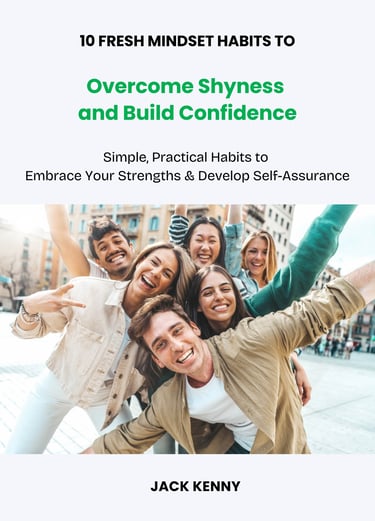10 Fresh Mindset Habits to Overcome Shyness and Build Confidence
8 min read


Not all of us are oozing unlimited confidence.
And I do count our lucky stars that we don’t have a world of overly confident people. Being shy isn’t a bad thing. It’s just a part of who you are. Some people are naturally more outgoing, while others prefer to hang back and observe. And that’s totally fine! We all have different personalities, and shyness is just one of those traits that some people experience more than others. But when shyness starts getting in the way of enjoying life, making connections, or doing things you really want to do, it might be time to take a closer look at it and consider making a change.
Shyness isn’t a flaw, it’s just part of who you are, and it’s something that can change with time and effort. You don’t have to be loud or outgoing to be confident. It’s about feeling comfortable in your own skin, even when nervous. Confidence grows with small actions like making eye contact with the barista, saying "hello" to a colleague, or just asking a stranger for directions. It’s not about perfection, but about pushing through those moments of fear and building your self-assurance bit by bit, learning to embrace your unique qualities along the way.
Here are 10 simple ways to help you break free from shyness and embrace a more confident version of yourself.
1. Acknowledge Your Shyness
Shyness isn't a weakness, and it’s definitely not something to hide behind a "shy person" t-shirt. It’s a normal feeling, something everyone experiences at some point, whether you're fine in large groups or completely freaked out about speaking in front of just a couple of people.
The trick is to understand that it doesn’t define you. It's just a temporary feeling that doesn’t need to control your life. Recognizing what triggers your shyness, whether it's large crowds or the fear of saying something dumb, gives you the power to tackle it head-on. It’s like preparing for a test. You expect the tough questions, so you can handle them better when they come.
2. Start Small
You are not going to have a magic wand waved over you and you become a famous rock star belting out tunes to 120,000 people with ease. I wish it was that easy, but like all aspects of life, the greatest achievement and progress take place, one small yet powerful step at a time.
Shyness can feel like an invisible weight, making it tough to engage with the world, even though you want to. It’s not about not wanting to connect, it’s about feeling overwhelmed by the idea of putting yourself out there.
The good news is, you don’t have to dive into big crowds to beat it. Start small, like stretching a muscle, and practice in low-pressure moments. Even just saying "hello" to someone is a solid step, and you might realize they feel the same awkwardness.
Each tiny interaction proves you can engage without the world collapsing, and over time, those small actions will add up. What once felt intimidating, like small talk, becomes easier, and soon, those bigger social situations won’t seem as terrifying.
3. Prepare for Social Situations
We prepare for exams or meetings, don’t we?
We don’t go into situations with guns blazing with no idea of what will take place or what our game plan is. Dealing with shyness is the same. A bit of preparation can make the situation so much more pleasant and comfortable.
Feeling shy often comes from worrying about how others will perceive you and overthinking what to say, but you can ease that anxiety by preparing ahead. It’s like prepping for a job interview. Having a few opening lines or conversation starters ready takes the pressure off and makes socializing feel less intimidating.
Remember, most people are too focused on themselves to analyze what you're saying, so relax and know it’s okay if things don’t go perfectly. Everyone has awkward moments. Preparation helps manage anxiety and shifts the focus from worst-case scenarios to simple, relaxed interactions.
4. Focus on Others
People love to talk about themselves, so let them. Instead of worrying about how you're coming across, shift your focus outward and pay attention to the people around you. Ask them about their day, passions, or what’s on their mind, and you'll quickly realize that the pressure lifts.
You’re no longer the center of attention. You become the listener, the curious observer, and that’s incredibly freeing. When you give others the microphone, they open up, share their experiences, and you don’t have to stress about what to say next. Conversations flow naturally, and that’s where the magic happens. The more you listen, the more trust builds, and real connections form.
So, next time you’re feeling nervous in a social situation, take a breath, focus on the person in front of you, and let the conversation unfold.
5. Challenge Negative Self-Talk
You can talk yourself out of anything easier than you think, and that is a real shame.
Shyness can make speaking up feel like a monumental task, with negative thoughts holding you back, convincing you that it's safer to stay quiet. These thoughts—"What if I say something stupid?"—are just that: thoughts, not facts, and they’re often rooted in fear trying to keep you small and safe.
But breaking that cycle is possible. You can reframe those negative thoughts and replace them with affirmations like, "I have something valuable to say." With practice, this helps rewire your brain to believe in your worth, building your confidence over time.
Remember, no one is perfect, and awkward moments happen to everyone. The key is how you respond to them. When you challenge those negative thoughts, you're creating a more confident version of yourself. It's like an old, well-loved table—imperfect, but full of character. Your flaws make you unique, so embrace them and trust that you have something worth contributing.
6. Practice Mindfulness
Shyness can be tricky. It’s not a simple walk in the park. At times it feels like you are climbing Mount Everest in a pair of flip-flops.
Shyness often spirals when we overthink, dwelling on past embarrassments or stressing over imaginary future scenarios. The “what ifs”—what if I say something wrong or look awkward? They build up until they freeze us in place, making it harder to just speak up. Instead of embracing the moment, we let our worries rule, and before we know it, the chance has passed and we’re kicking ourselves for not saying what we wanted.
Practicing mindfulness, like focusing on the present moment, helps break this cycle. When we focus on what's actually happening around us our anxious thoughts fade. By listening more attentively and embracing where we are, we can ease our self-doubt, make conversations flow naturally, and, over time, feel more grounded and less stuck in our heads.
7. Step Out of Your Comfort Zone
Life should not be about maintaining the status quo. It can get pretty boring if we just keep doing the same thing every day. Life is short, and we need to make the most of it. Shake it up a bit, add some spice, and do something new and exciting.
Now, this may sound like the monologue for an aftershave commercial, but it should be a philosophy we aim to live by.
Human nature thrives on curiosity and the drive to improve, which is why growth only happens when you step outside your comfort zone. It’s a simple yet powerful concept. Those moments when you’ve truly learned or felt accomplished usually didn’t happen while you were cruising along. They came when you faced a challenge or tried something unfamiliar that pushed you out of your safe, predictable routine. Comfort zones are great because they feel safe, but they can also keep us stuck, preventing us from discovering what we're really capable of.
The key to breaking free doesn’t require huge leaps, it’s about small steps. Start with tiny, manageable goals that nudge you in a new direction, like striking up a conversation or joining a group. Just like working out, the more you push yourself, the more adaptable and resilient you become. Fear will always be there, but focusing on what’s possible, like success or unexpected opportunities, will help you overcome it..
8. Surround Yourself with Supportive People
Your immediate surroundings will have the greatest influence on how you see and perceive your world. So, given the choice, is it best to surround yourself with positive and uplifting people or those who want to criticize and bring you down? Is this a trick question? It is such a simple question, but how many people are surrounding themselves with the wrong people?
The people you spend time with can either lift you up or drain the life out of you, which is why it’s so important to surround yourself with those who inspire and encourage your growth. A solid support system makes life's challenges feel more manageable, and having people who see your strengths, even when you don’t, can be life-changing.
Of course, friendships should also be fun. Life's not worth living if it's all doom and gloom. If your circle doesn’t bring you joy and laughter, it's time to reassess who you’re spending your time with. When you have the right people by your side, those who truly have your back, life becomes a lot more enjoyable, and you’ll feel more confident tackling whatever comes your way.
9. Learn to Laugh at Yourself
Life is about having some fun. Every little decision we make or action we take is life or death and getting everything right. It doesn’t have to be this rigid. We have to relax a bit and accept that we are who we are and can only do what we can. If we mess up, so be it. If we say something wrong, learn from it.
Life isn’t about constantly scrutinizing yourself and kicking yourself every single time you make a mistake. Remember, we are all trying our best and don’t intentionally mean to fuck up or cause harm. That’s not how we are wired. Can’t we sometimes take things a little less seriously and laugh at ourselves instead of being our own worst and harshest critics?
Shyness is something we all experience when stepping into new situations, and that nagging voice in your head whispering, “What if I mess up?” can be suffocating. Remember no one is fucking perfect, and expecting yourself to be is simply wrong. Mistakes are part of being human, and instead of fearing them, try seeing them as opportunities to grow. When you mess up, laugh it off, because that’s what makes you relatable and real. The people who matter don’t expect perfection, they appreciate you for owning your flaws and moving forward anyway.
10. Celebrate Your Progress
Life is to be celebrated.
Celebrating every little step forward is crucial, but we often forget to do it. We get so caught up in the rush to reach our big goals that we overlook the small wins that actually lay the foundation for everything else. Whether it’s striking up a conversation with someone you’ve been nervous to talk to or pushing through your anxiety to do something you’ve been avoiding, those moments matter. They're proof that you're moving in the right direction, even if it doesn’t feel like it at first.
When we focus on the small wins, we train our brains to celebrate progress, not perfection. Perfection is impossible and frustrating, but progress is something everyone can feel good about. Acknowledging even the smallest victories is a powerful motivator. It tells your brain, "I’m getting closer." The more you celebrate those steps, the more you’ll build momentum, and that’s when things really start to happen.
Want to put these habits into action?
We have an exciting book available on Amazon in eBook and paperback format. It is packed with insights and practical steps to help you explore this topic in greater depth.
Plus, with every purchase, you’ll receive a free interactive PDF workbook featuring interactive questions and activities designed to help you apply what you've learned and create real change.
Free Book when you subscribe
Don't forget to subscribe today and receive a free 79-page book:
10 Fresh Mindset Habits to Create New Day’s Resolutions, Instead of New Year’s Goals.



